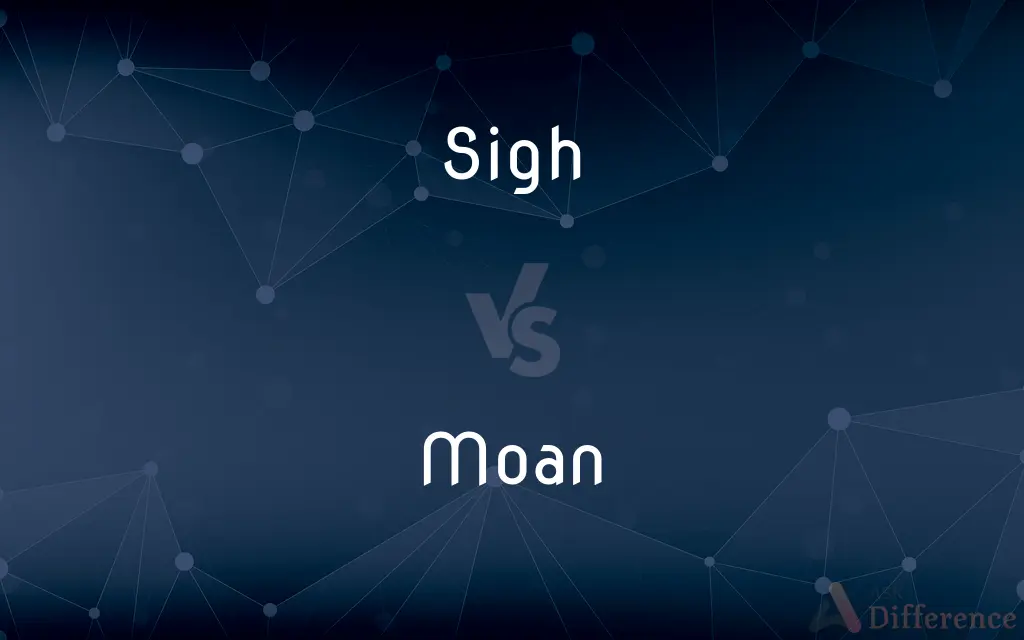Sigh vs. Moan — What's the Difference?
By Tayyaba Rehman & Fiza Rafique — Updated on April 4, 2024
A sigh is a long, deep breath expressing sadness, relief, or tiredness, while a moan is a long, low sound indicating pain, sorrow, or pleasure.

Difference Between Sigh and Moan
Table of Contents
ADVERTISEMENT
Key Differences
A sigh typically represents a silent or audible expression of emotions such as relief, exasperation, or longing, often resulting from a deep inhalation followed by a slower, audible exhalation. It's a form of non-verbal communication that can convey a range of emotions without words. On the other hand, a moan is usually a more vocalized expression that can indicate discomfort, dissatisfaction, or pleasure. Moans are often associated with physical or emotional pain but can also express intense emotions or sensations.
While sighing is more about expressing feelings internally, such as disappointment or relief, moaning is generally directed outwardly, signaling to others a state of being, whether it be distress or ecstasy. This difference highlights how sighs are often more about self-reflection or reaction to a situation, whereas moans are more likely to be a response to physical or emotional stimuli that is communicated to others.
In terms of physiology, a sigh is primarily a respiratory function that can help to reset the breathing pattern or express emotional states. Moaning, however, involves not only the respiratory system but also the vocal cords, indicating a stronger or more intense emotional or physical state.
Contextually, sighs are common in everyday situations, reflecting a wide range of emotions from frustration to satisfaction. Moans, by contrast, are more often associated with specific circumstances like experiencing pain, suffering, grief, or during moments of happiness or pleasure.
The social perception of sighs and moans also differs. Sighs are generally more socially acceptable in various settings, conveying feelings in a subtle way. Moans, depending on their cause and the cultural context, can sometimes be considered too intimate or private for public expression.
ADVERTISEMENT
Comparison Chart
Definition
A long, deep breath expressing emotions such as sadness or relief.
A long, low sound indicating pain, sorrow, or pleasure.
Expression
Internal, reflective.
External, communicative.
Associated Emotions
Sadness, relief, tiredness.
Pain, sorrow, pleasure.
Physiology
Respiratory function, often silent.
Involves respiratory and vocal systems, usually vocalized.
Context
Everyday situations, wide range of emotions.
Specific circumstances, intense emotions or physical states.
Social Perception
Generally acceptable and subtle.
May be considered intimate or private depending on the context.
Compare with Definitions
Sigh
Expression of relief.
She sighed in relief after finishing the marathon.
Moan
Expression of displeasure.
She moaned about the long queue at the checkout.
Sigh
A sign of longing.
She sighed at the thought of the missed opportunity.
Moan
Sound of physical pain.
The patient moaned in discomfort during the examination.
Sigh
Reflecting tiredness.
With a tired sigh, he closed his book and went to bed.
Moan
Indicator of grief or sorrow.
They moaned in despair at the loss of their friend.
Sigh
Indication of frustration.
He sighed heavily when he saw the pile of paperwork.
Moan
Signaling emotional suffering.
Lost in his thoughts, he moaned softly, remembering past regrets.
Sigh
Non-verbal communication of resignation.
He sighed, knowing there was no more to say.
Moan
Vocalization of pleasure.
The audience moaned in appreciation at the exquisite taste of the dish.
Sigh
Emit a long, deep audible breath expressing sadness, relief, tiredness, or similar
Harry sank into a chair and sighed with relief
Moan
A complaint which is perceived as trivial and not taken seriously by others
There were moans about the car's feeble ventilation
Sigh
A long, deep audible exhalation expressing sadness, relief, tiredness, or similar
The councils heaved a sigh of relief when they saved over £6m between them
She let out a long sigh of despair
Moan
Complain or grumble, typically about something trivial
Passengers moaned about overcrowded coaches
My friend always moans that I never make her a cake
Sigh
To exhale audibly in a long deep breath, as in weariness or relief.
Moan
A low, sustained, mournful cry, usually indicative of sorrow or pain.
Sigh
To emit a similar sound
Willows sighing in the wind.
Moan
A similar sound
The eerie moan of the night wind.
Sigh
To feel longing or grief; yearn
Sighing for their lost youth.
Moan
A complaint
His tiresome moans about his boss.
Sigh
To express with or as if with an audible exhalation.
Moan
To utter a moan or moans.
Sigh
(Archaic) To lament.
Moan
To make a sound resembling a moan
A saxophone moaned in the background.
Sigh
The act or sound of sighing.
Moan
To complain, lament, or grieve
An old man who still moans about his misspent youth.
Sigh
(intransitive) To inhale a larger quantity of air than usual, and immediately expel it; to make a deep single audible respiration, especially as the result or involuntary expression of fatigue, exhaustion, grief, sorrow, frustration, or the like.
When she saw it wasn't damaged, she sighed with relief.
He sighed. It was going to be a long night.
He sighed over the lost opportunity.
Moan
To bewail or bemoan
She moaned her misfortunes to anyone who would listen.
Sigh
(intransitive) To lament; to grieve.
Moan
To utter with moans or a moan.
Sigh
(transitive) To utter sighs over; to lament or mourn over.
Moan
A low, mournful cry of pain, sorrow or pleasure
Let out a deep moan
We heard the distant moan of a stag in pain.
Sigh
(intransitive) To make a sound like sighing.
Moan
To complain about; to bemoan, to bewail; to mourn.
Sigh
(transitive) To exhale (the breath) in sighs.
She sighed a sigh that was nearly a groan.
Sigh a note and sing a note
Moan
To grieve.
Sigh
(transitive) To express by sighs; to utter in or with sighs.
"I guess I have no choice," she sighed.
She sighed her frustrations.
Moan
(transitive) To say in a moan, or with a moaning voice.
‘Please don't leave me,’ he moaned.
Sigh
A deep, prolonged audible inhale and exhale of breath; as when fatigued, frustrated, grieved, or relieved; the act of sighing.
Moan
To complain; to grumble.
Sigh
(figurative) a manifestation of grief; a lament.
Moan
To distress (someone); to sadden.
Sigh
(Cockney rhyming slang) A person who is bored.
Moan
To make a low prolonged sound of grief or pain, whether articulate or not; to groan softly and continuously.
Unpitied and unheard, where misery moans.
Let there bechance him pitiful mischances,To make him moan.
Sigh
An expression of fatigue, exhaustion, grief, sorrow, frustration, or the like, often used in casual written contexts.
Sigh, I'm so bored at work today.
Moan
To emit a sound like moan; - said of things inanimate; as, the wind moans.
Sigh
To inhale a larger quantity of air than usual, and immediately expel it; to make a deep single audible respiration, especially as the result or involuntary expression of fatigue, exhaustion, grief, sorrow, or the like.
Moan
To bewail audibly; to lament.
Ye floods, ye woods, ye echoes, moanMy dear Columbo, dead and gone.
Sigh
Hence, to lament; to grieve.
He sighed deeply in his spirit.
Moan
To afflict; to distress.
Which infinitely moans me.
Sigh
To make a sound like sighing.
And the coming wind did roar more loud,And the sails did sigh like sedge.
The winter winds are wearily sighing.
Moan
A low prolonged sound, articulate or not, indicative of pain or of grief; a low groan.
Sullen moans, hollow groans.
Sigh
To exhale (the breath) in sighs.
Never man sighed truer breath.
Moan
A low mournful or murmuring sound; - of things.
Rippling waters made a pleasant moan.
Sigh
To utter sighs over; to lament or mourn over.
Ages to come, and men unborn,Shall bless her name, and sigh her fate.
Moan
An utterance expressing pain or disapproval
Sigh
To express by sighs; to utter in or with sighs.
They . . . sighed forth proverbs.
The gentle swain . . . sighs back her grief.
Moan
Indicate pain, discomfort, or displeasure;
The students groaned when the professor got out the exam booklets
The ancient door soughed when opened
Sigh
A deep and prolonged audible inspiration or respiration of air, as when fatigued or grieved; the act of sighing.
I could drive the boat with my sighs.
Sigh
Figuratively, a manifestation of grief; a lan ent.
With their sighs the airFrequenting, sent from hearts contrite.
Sigh
An utterance made by exhaling audibly
Sigh
A sound like a person sighing;
She heard the sigh of the wind in the trees
Sigh
Heave or utter a sigh; breathe deeply and heavily;
She sighed sadly
Sigh
Utter with a sigh
Common Curiosities
Is moaning always a sign of distress?
No, moaning can also express pleasure or intense emotions positively.
Can sighing be beneficial?
Yes, sighing can reset the breathing pattern and relieve stress.
Why do people moan in pain?
Moaning can be an involuntary response to pain, helping to express the intensity of discomfort and potentially solicit help or sympathy from others.
How do sighs and moans differ in communication?
Sighs are more about expressing internal states or reactions, often silently, while moans are more likely to be a vocal expression intended to communicate with others.
What triggers a sigh?
Sighs can be triggered by a wide range of emotions, including sadness, relief, boredom, and frustration.
Is it normal to sigh a lot?
Occasional sighing is normal, but excessive sighing might indicate underlying stress or respiratory issues.
Can sighing or moaning be controlled?
While they can be involuntary, people can learn to control sighing and moaning, especially in social situations.
Can animals sigh or moan?
Animals can produce sounds similar to sighs or moans, often as part of their communication or response to stimuli.
Do sighs and moans have therapeutic uses?
In some therapies, vocalizing through sighs or moans can be encouraged as a way to release emotional tension and stress.
What cultural differences exist in perceiving sighs and moans?
Cultural norms can influence how sighs and moans are interpreted, with some cultures viewing them as more private or expressive than others.
Share Your Discovery

Previous Comparison
Idiot vs. Porcupine
Next Comparison
Subsonic vs. SupersonicAuthor Spotlight
Written by
Tayyaba RehmanTayyaba Rehman is a distinguished writer, currently serving as a primary contributor to askdifference.com. As a researcher in semantics and etymology, Tayyaba's passion for the complexity of languages and their distinctions has found a perfect home on the platform. Tayyaba delves into the intricacies of language, distinguishing between commonly confused words and phrases, thereby providing clarity for readers worldwide.
Co-written by
Fiza RafiqueFiza Rafique is a skilled content writer at AskDifference.com, where she meticulously refines and enhances written pieces. Drawing from her vast editorial expertise, Fiza ensures clarity, accuracy, and precision in every article. Passionate about language, she continually seeks to elevate the quality of content for readers worldwide.














































